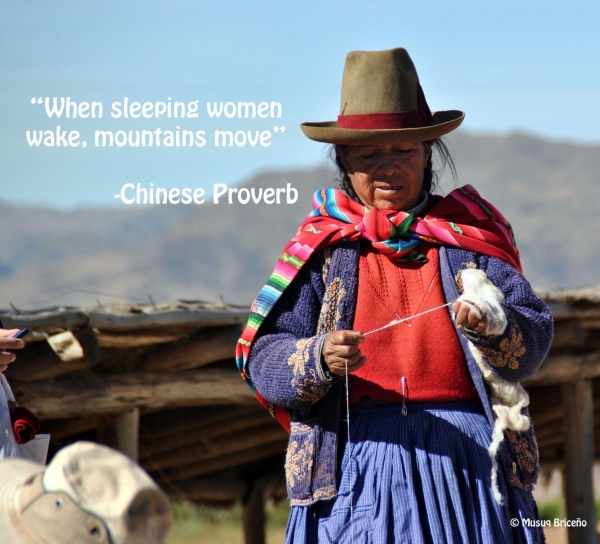Opinion: When we forget that climate change policies are also a matter of gender

In the Municipality of Arque, in the Bolivian Andes, Feliciana Callata starts her day before the sun rises. She prepares food for her children and then gets ready for the agricultural activities she willdo during the day. She walksten kilometers to her farm where she will plant, cultivate, collect and select the potatoes that she will sell the following day in the market of her community. Feliciana is the only person who is responsible for her family for the reason that her husband works in the city.[1]
This is the daily routine of several women in the Andes and other mountain areas. Only 34% of women in the Andean region are enrolled in high school.[2] As in many other countries, we do not only suffer from sexual discrimination and limited access to financial credit, we are vulnerable to physical and psychological violence,as well. Moreover, because of our socio-economic status we are more vulnerable to the impacts and risks of climate change.
In addition of being responsible for the household, caring the familyand food security, especially in mountain areas, women are knowledgeable of the traditional value of different products. We are managers of the resources that nature provides us. However, our opinions and ideas are not being reflected in the environmental governance. We lack of influence and power to act, we have a limited representation in high level decision making.
The gender approach -duringclimate negotiations under the United Nations Framework on Climate Change- has been one of the first steps for women empowerment in relation to climate change policies and principles. An example of this is the Rio Declaration on Environment and Development where the Principle 20 states:
“Women have a vital role in environmental management and development. Their full participation is therefore essential to achieve sustainable development.”
It is constantly stated in political instruments, such as declarations, objectives and strategies, the importance of women for achieving sustainable development and combating climate change.However, how our participation has increased? Which are the plans in order to women have more political influence in environmental topics? If we are responsible for the management of natural resources, should not we have more influence during climate change meetings and negotiations?
It is not only necessary to make reference to the importance of women for sustainable development and climate change, it is important to provide different methods to increase female participation in environmental high level decision and policy making.
The Andean countries have demonstrated a stable economic development in the last years. Empowering women and allowing them to participate equally in environmental governance, especially in mountain areas where women work directly with and depend on natural resources, is critical not only to achieve the “famous” sustainable development we discuss and desire, but for the successful implementation of environmental policies. Not only in the local but in the international level.
In order to achieve gender integration, it is necessary the constant commitment of the different levels of government. Provide information and training to governmental heads about the importance of gender is the first step. In addition, it is necessary to promote the participation of women in the creation of environmental policies and programs, especially in vulnerable zones, as mountain areas.
The efforts to achieve the Sustainable Development Goals and tackle climate change, will have a major result if we could exercise a collective voice as decision makers, leaders, innovators, entrepreneurs, managers and experts in natural resources.
[1]Red Argentina de Municipios Frente al Cambio Climático. 2015. “Mujeres de los Andes aplican acciones contra el cambio climático” Availableon: http://www.ramcc.net/index.php?option=com_k2&view=item&id=384:mujeres-de-los-andes-aplican-acciones-contra-el-cambio-clim%C3%A1tico&Itemid=499 (último acceso 1/10/2015)
[2]World Bank. 2015. “Inscripción escolar, nivel terciario, mujeres”. Availableon: http://datos.bancomundial.org/indicador/SE.TER.ENRR.FE/countries?display=graph (Último acceso 01/10/2015)


Facebook comments